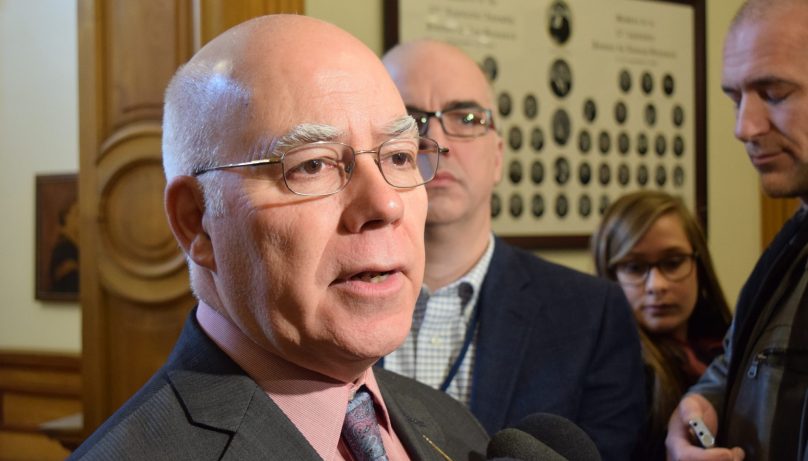Natural resources minister in Alward government says Irving letter got him fired – CBC NEWS – 8 January 2018

Author by: CONNELL SMITH
“Governments, whether it’s this government or the previous Conservative government, will stand with Jim Irving, will stand with JDI. They have repeatedly made that decision.”-David Coon
Pressure from Jim Irving led former premier David Alward to switch natural resources ministers, says Bruce Northrup, speaking for the first time about how he lost the portfolio in a cabinet shuffle four years ago.
The shuffle came months after Irving, the co-CEO of J.D. Irving Ltd., sent a frankly worded letter to the Progressive Conservative premier, expressing frustration that Northrup seemed opposed to increasing how much Crown land should be made available to industry.In the letter, Irving attacks decisions Northrup made, saying they were disruptive and hasty and showed a lack of understanding of the consequences.
The letter was first published almost two years ago by the Halifax Media Co-op, but only recently did Northrup agree to discuss the lrving letter and its possible role in his removal from the natural resources department.
Northrup said he believes Irving’s written intervention led to his move to the Department of Public Safety.
“I have a strong feeling that did it for sure,” Northrup said in an interview with CBC News. “I don’t think some people wanted me in that department. Obviously, that was the premier of the day’s decision and I respect his decision.”
In a province where about half the wood supply comes from publicly owned Crown land, Northrup’s story raises questions about how much control industry has over government decision-making.
At the time, the province was under pressure from J.D. Irving to decrease the amount of Crown conservation land protected from timber harvesting to 23 per cent from 28 per cent.These parcels include buffer zones along rivers, deer-wintering areas, protected natural areas, and old growth forest.
In the letter to Alward, Irving pointed in particular to what he called “another unfortunate example” of a Northrup decision — a statement he alleged Northrup made at a meeting of the New Brunswick Environmental Network in February 2013.
“At this meeting the Minister confirmed the Province’s intention to maintain Conservation Areas at 28%,” Irving wrote.
“This seriously compromises the work we have been undertaking since June 2012 — at the request of the Province — to define and realize capital investment opportunities that would put hundreds of New Brunswickers to work, which would in turn generate tens of millions of dollars in new wages and related tax revenues to the Province.”
The letter to Alward ended with a warning: “Without the necessary wood supply, we will have to reduce the size and scope of our mill modernization and investment plans.”A spokesperson for JDI declined a CBC request for an interview about the letter, which is dated Feb. 27, 2013.
A spokesperson said that in his current role, Alward cannot comment on issues related to his term as premier.
Paul Robichaud, who replaced Northrup as natural resources minister, would not comment on the issue, but former Alward adviser Dallas McCready dismissed the idea that Irving had a hand in the cabinet shuffle.”It certainly wasn’t the result of that letter,” said McCready, who advised the government about industrial initiatives.
He said it was a time of uncertainty in the forest industry, and other Crown land licensees were also looking for help.Twin Rivers, he said, had been forced to stop accepting pulpwood from the private sector, causing turmoil in the north of the province.
‘Governments, whether it’s this government or the previous Conservative government, will stand with Jim Irving, will stand with JDI. They have repeatedly made that decision.’
– David Coon, Green Party leader
The companies came to the provincial government “with a pretty unified voice,” McCready said.
Northrup was regarded by the province’s private woodlot groups as a minister who understood their concerns.
Woodlot marketing boards have said that access by Irving and other big industry players to large volumes of public wood has created poor market conditions for private wood sales.”We did feel we had a good working relationship with him,” said Rick Doucett of the New Brunswick Federation of Woodlot Owners.

Alward and Irving appeared together in Chipman at a news conference following the release of the Progressive Conservative government’s forestry plan. (CBC)
“There’s been many times working in the private wood sector that we’ve started to work with a particular minister of natural resources that seemed to get it, seemed to want to work with us, seemed to want to do something different. And all of a sudden, they weren’t there anymore. And then we started to talk to the same kind of people that we talked to before.”
Green Party Leader David Coon said the Bruce Northrup incident is emblematic of the relationship in New Brunswick between the government and Irving.
“The government threw Bruce Northrup under the bus, their own minister of natural resources, their own member, and appointed a new minister,” said Coon.”Governments, whether it’s this government or the previous Conservative government, will stand with Jim Irving, will stand with JDI. They have repeatedly made that decision. That’s who they stand with, rather than standing with the woodlot owners around the province.”
Northrup defended the decisions he made as minister. He said he fought attempts by industry to persuade the government to reduce the size of the conservation forest, fearing it would hurt the market for timber from private woodlots.
Paul Robichaud (right) replaced Northrup as the natural resources minister in the Alward government. (CBC)
“It supplies too much of the wood [needed by industry] and takes it away from private woodlot operators,” said Northrup.”I really thought the private woodlot operators could have supplied that wood to the mills.”As for his comments at the Environmental Network meeting, Northrup said they were misrepresented by a JDI employee who was there.”I’ll say the same thing till I die, that I was misquoted, and that was taken back to Saint John to the head office.”Move hurt marketing boards
Northrup said he had hoped the size of Crown conservation areas could be maintained at 25 or 26 per cent of the total. He was disappointed with his government’s subsequent decision to reduce the size of the conservation forests to 23 per cent from 28.
This hurt New Brunswick’s wood marketing boards and may be a factor in the U.S. Commerce Department’s decision to slap anti-dumping duties on the province’s lumber products.Washington has described the New Brunswick market as an “oligopsony,” where a few companies dominate and have considerable power to control prices.
A Commerce Department memo pointed to the 2014 decision that allowed more harvesting of Crown trees as a problem for the private wood market, saying the big mills were using private wood merely as a secondary option.
“I think if we would have stayed around 26 or 25 [percent] then I don’t think it would have been as big a deal as it is right now,” said Northrup.
In the lead-up to the 2014 provincial election, the Brian Gallant Liberals promised to review and possibly change the previous Progressive Conservative government’s forestry plan.Letter from Jim Irving, the co-CEO of J.D. Irving Ltd., to then-premier David Alward. (Halifax Media Co-op)More than two years later, in February 2017, Gallant described the file as “complex” and said the wood allocation provisions could not be changed because of contracts signed with industry by the Alward government.
In a statement Friday, a spokesperson said the government has released relevant documents related to the plan and remains committed to releasing a review of the forest strategy.In December, the CBC reported on efforts by JDI and others to circumvent the province’s marketing board system by requiring woodlot owners to make direct contracts for the sale of their wood. The Liberal government has stayed out of the conflict between the boards and big industry.
The boards, meanwhile, are losing their ability to negotiate wood prices on behalf of their members.
JDI has stopped buying any wood through the Sussex-based SNB board and has expanded that practice to other territories.